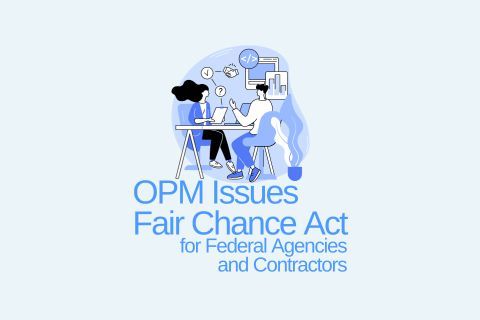OPM Issues Fair Chance Act for Federal Agencies and Contractors
- Home
- Self-Check Blog
- Self-Check
- OPM Issues Fair Chance Act for Federal Agencies and Contractors

September 20, 2023
The Office of Personnel Management (OPM) has approved final regulations affecting federal agencies and contractors. As of this approval, federal agencies and contractors can no longer ask job applicants about their criminal history before making a conditional job offer. Though many agencies already had policies reflecting this requirement, the OPM mandating it can improve job opportunities for many.
The OPM initially proposed the policy in 2022 to address some applicants’ struggles due to criminal backgrounds. However, it originally appeared in the 2020 National Defense Authorization Act, which expanded the OPM’s “ban-the-box” policy from 2016. These final regulations offer greater detail about implementing the Fair Chance Act.
According to the final regulations, “Unless otherwise required by law, an employee of an agency may not request, in oral or written form (including through the Declaration for Federal Employment (OF 306) or any similar successor form, the USAJOBS internet website, or any other electronic means) that an applicant for an appointment to a position in the civil service disclose criminal history record information regarding the applicant before the appointing authority extends a conditional offer to the applicant.”
As such, previously incarcerated individuals have improved chances of acquiring work in federal agencies or contracts. This change puts them on equal footing with other applicants, allowing fair and equal opportunities for everyone. Furthermore, the final regulations adhere to President Joe Biden’s 2021 executive order, which allowed the OPM to evaluate and improve hiring opportunities. This order specified the need to expand on diversity, equity, inclusion, and accessibility for federal hiring.
However, the final regulations include exceptions for several positions. The OPM provided examples of exempt positions, including those accessing classified information, interacting with minors, and accepting or retaining in the military.
The Fair Chance Act also included a process for applicants who feel the employer has violated their rights. It also details the steps employers must take when considering adverse action based on an applicant’s criminal history. Violating the Fair Chance Act could include written warnings, civil penalties, and suspension without pay.
Unfortunately, the effect of current “ban-the-box” laws on hiring remains unclear. However, the OPM intends to implement a strategy for collecting data to verify the trends’ impact. Until then, the Office expects these final regulations to improve employment opportunities for anyone with a criminal background.
Interested individuals should consider a self-background check before applying for a federal job. A self-check allows you to correct any errors before potential employers see them. It also helps you prepare to explain any negative information that could cause delays in the hiring process.
Background checks don’t have to be complicated. Try running a self background check today and give yourself a head start.
